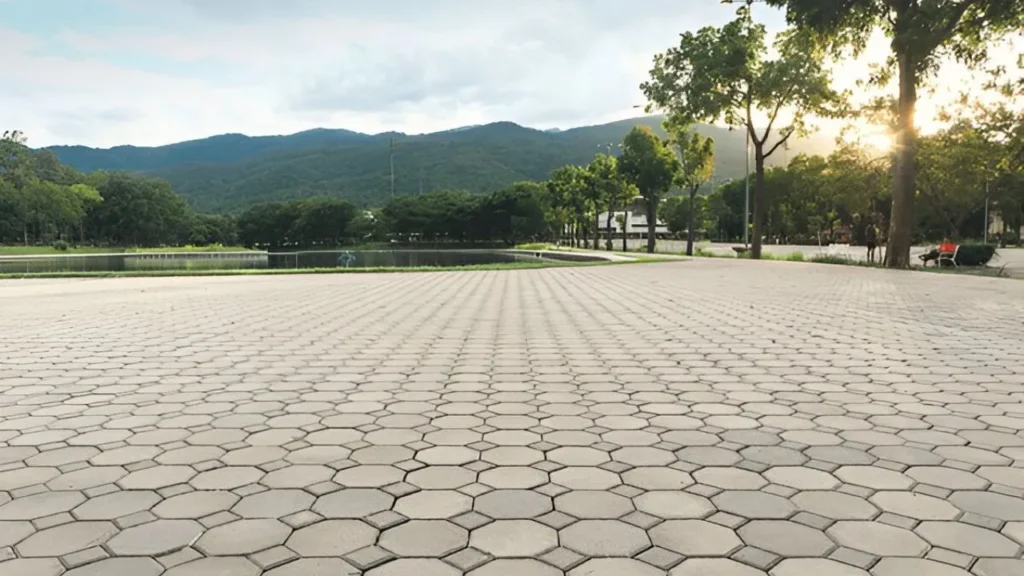
Concrete pavers are a popular choice for driveways, offering a combination of durability, aesthetic appeal, and versatility. In this article, we will delve into the advantages, considerations, and maintenance of concrete pavers, providing all the essential details to help you make an informed decision about using them for your driveway.
Why Choose Concrete Pavers for Driveways?
1. Durability and Longevity
Concrete pavers are known for their exceptional durability. They can withstand heavy loads and resist cracking better than poured concrete. Pavers can last for decades, even under frequent vehicular traffic, when appropriately installed on a stable base.
- Load Capacity: Designed to handle the weight of cars, SUVs, and even heavy trucks.
- Resistance to Cracking: Unlike poured concrete, which is prone to cracking due to temperature fluctuations, pavers flex slightly, accommodating ground movement.
2. Aesthetic Versatility
Concrete pavers come in various colors, shapes, and patterns, allowing homeowners to create customized designs that complement their home’s exterior.
- Customization Options: The design possibilities are endless, from herringbone to basketweave patterns.
- Color Variations: Available in earth tones, grays, reds, and more, enabling seamless integration with landscaping.
3. Easy Maintenance and Repairs
Maintaining concrete pavers is straightforward. Regular cleaning and occasional resealing keep them looking new.
- Individual Replacement: Damaged pavers can be easily replaced without disrupting the driveway.
- Resistant to Stains: With proper sealing, pavers resist oil and other automotive fluids stains.
How Are Concrete Pavers Installed?
1. Preparing the Base
The key to a long-lasting paver driveway is a properly prepared base.
- Excavation: Remove soil to the required depth, ensuring room for the paver base and sub-base.
- Base Material: Add a layer of crushed stone or gravel, which is compacted to create a stable foundation.
- Sand Layer: Apply a thin layer of sand to create a level surface for laying pavers.
2. Laying the Pavers
Pavers are laid in the desired pattern, starting from one corner and working outward.
- Spacing and Alignment: Ensure consistent spacing using spacers and straight edges.
- Edging: Secure the edges with a strong border to prevent shifting.
3. Finishing Touches
Once the pavers are in place, the joints are filled with sand, and the surface is compacted.
- Joint Sand: Sweep sand into the joints to lock the pavers in place.
- Compaction: Use a plate compactor to ensure the pavers settle evenly.
Advantages of Concrete Pavers over Other Driveway Materials
Feature | Concrete Pavers | Poured Concrete | Asphalt |
| Durability | High | Moderate | Moderate |
| Customizability | High | Low | Low |
| Ease of Repair | Easy | Difficult | Difficult |
| Aesthetic Appeal | High | Moderate | Low |
Maintenance Tips for Concrete Paver Driveways
1. Regular Cleaning
Sweep your driveway regularly to remove dirt and debris. Power washing can help eliminate tougher stains.
2. Sealing the Pavers
Seal the surface every two to three years to enhance stain resistance and protect against wear.
3. Weed Control
Apply polymeric sand to prevent weed growth between pavers.
Common Concerns about Concrete Pavers
- Cost: While the initial cost of concrete pavers may be higher than asphalt or poured concrete, their durability and low maintenance make them cost-effective in the long term.
- Installation Time: Paver driveways may take longer to install than other materials. However, the customizable aesthetic and durability outweigh this drawback for many homeowners.
Conclusion
Concrete pavers are an excellent driveway choice, combining durability, style, and low maintenance. Whether you want to upgrade or install a new driveway, pavers offer a long-term solution that enhances your property’s curb appeal and functionality. Invest in professional installation and regular upkeep to maximize the benefits of your concrete paver driveway.
Frequently Asked Questions
Yes, concrete pavers are generally more durable and resistant to cracking compared to poured concrete. They offer better flexibility, making them less prone to damage from temperature fluctuations and ground movement.
With proper installation and maintenance, concrete paver driveways can last 25 to 50 years. Their ability to flex and distribute weight effectively contributes to their longevity.
No, concrete pavers are relatively low-maintenance. Regular sweeping, occasional power washing, and sealing every few years help maintain their appearance and durability.
Yes, when installed on a properly compacted base, concrete pavers can support the weight of cars, SUVs, and even heavy trucks without cracking or sinking.
Applying polymeric sand between paver joints helps prevent weed growth and keeps the pavers locked in place. Regular sealing also minimizes weed intrusion.
